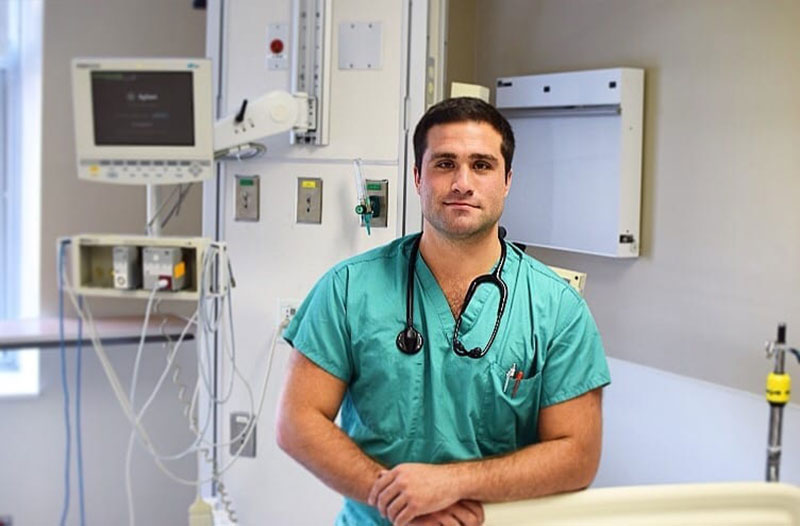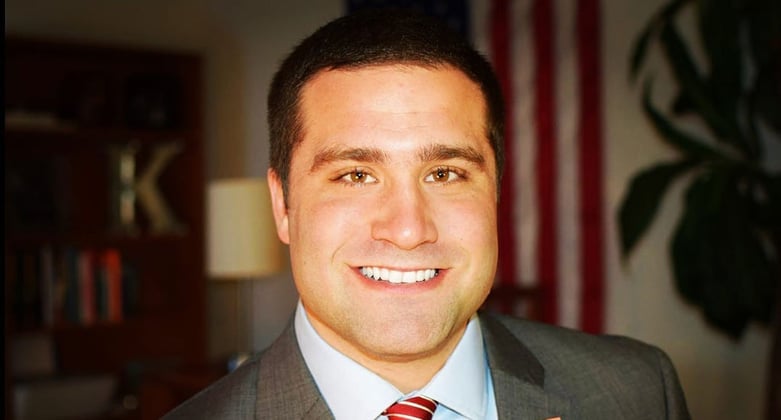UMHS student Brandon Kirshner, besides studying to become a doctor, is also running for a U.S. Congress seat.
Mr. Kirshner is campaigning to win the 25th Congressional District seat held by 15-term U.S. Representative Louise Slaughter in Western New York State. Mr. Kirshner, running as an independent, is also battling Republican Mark Assini for the seat.

UMHS MED STUDENT RUNS FOR U.S. CONGRESS SEAT: Brandon Kirshner hopes to win the 25th Congressional District seat in November. Photo: Courtesy of Brandon Kirshner
The UMHS Endeavour caught up with Brandon Kirshner to discuss why he’s running for Congress, the issues that are important to him, things he’s learned at UMHS and clinical rotations that’s he’s applying to politics, and why he’s passionate about everything from health care reform to tackling the national debt in the USA.
UMHS ENDEAVOUR: Brandon, tell us why you want to run for the 25th Congressional District seat.
BRANDON KIRSHNER: District 25 composes most of Monroe County in Rochester, New York. I decided to get into the Congressional race to give the people of Rochester a true choice in the upcoming election. Not a traditional choice (i.e., between a Democrat or Republican), but a real choice focused on real issues facing our district and our nation; not just party platforms.
You’ve said you want to run an independent campaign focusing on issues the big parties want to avoid. What are some of the issues in your platform?
The number one issue I’m running on is our astronomical national debt. We’re currently sitting at 19 trillion dollars and that number is only poised to grow. If we’re going to get back on track financially, we need to control our government spending. This is a topic that both political parties have trouble delivering.
I’m also a firm proponent of health care reform focused on overspending in the health care industry. The Affordable Care Act (ACA) was a good start regarding coverage for Americans, but cost was an afterthought and it’s spiraling out of control. Democrats are focused on the keeping the ACA in play; Republicans are focused on dismantling it. Neither party has a plan for cost.
Is there anything you’ve learned in med school at UMHS that you’d like to apply to politics?
UMHS has given me the opportunity to experience my clinical rotations at many hospitals across the United States. As such, I’ve had exposure to large health systems, rural clinics, community hospitals, and university centers. When I speak to American medical students, I often find that the majority of them are confined to their institution’s affiliated hospital. The vast exposure to different health centers, both geographically and demographically, has given me a clear view of the obstacles and pitfalls of each regarding health care delivery. Although each institution was different, there was one variable that remained the same throughout each: The cost of health care remained high and was often a barrier to efficient delivery of proper service.
What do you think about the Affordable Care Act (Obamacare)? What are the positive and negative aspects of it?
When the ACA was being built, lawmakers had a dilemma. They either needed to construct the law to deliver maximum coverage for the largest number of Americans, or they needed to focus on lowering the cost of healthcare throughout the system. Ultimately the ACA focused its efforts on coverage and it’s doing a decent job at it. However, that left cost to spiral out of control. Both the cost to hospitals and the cost to patients in the form of monthly premiums are truly unacceptable.
In terms of cost control, I believe that it needs to start on the front lines with the true spenders in health care, the doctors. The ACA promised sweeping medical tort reform but ultimately delivered nothing. Dollars lost to defensive medicine is going to add up to roughly 500 billion dollars over the next 10 years if we don’t start letting doctors participate in cost control. Science and treatment algorithms that have been tested over decades are being ignored in the name of fear from lawsuits and litigation.
What are some other issues you think are important?
Other than our national debt and healthcare cost reform, I’m really focusing my efforts on a better political system. If you’ve been paying attention to the presidential primaries, you’ll notice that the laws and policies in place are designed to protect incumbents and establishment politicians who are often products of special interest groups and lobbyists.
Political spending is through the roof, voters are being shut out of primaries, incumbent house members are being protected from opponents, and the American people are losing their voice. If we’re going to get our Democracy back, we need to support anti-corruption legislation, reforms such as term limits in Congress, and lowering the influence of money in our political system.
Were you to win, would you put your medical career on hold for a while?
The short answer is yes. However, if I were to win, I would be in a prime place to influence proper change to our health care system that I believe both health care workers and patients would support. I believe that this would be an instrumental piece to my overall medical career. That being said, I would deviate from the traditional path to pursue proper change, but I’ll be back.
How are you getting signatures to get on the ballot?
Walking and talking. We’re in the process of setting up a web of team members for each town that our district encompasses. When petition season starts (June 20th), we’ll be ready to take the streets and meet as many voters as possible.
What are some of the ways you're raising funds?
The beauty of our campaign is that it’s streamlined to the extent that raising funds is not our primary goal. If you talk to traditional politicians, everything is about fundraising and donations. With our campaign, everything is about change and reform. Our conversations consist of policy and a lot of listening rather than harping on people for money. That being said, we’re always open for donations! If you’d like to donate, you can do so online at kirshnerforcongress.com on the donate tab.
Aside from good people donating to the campaign under their own will, we’re also holding some non-traditional fundraising events throughout our city. On Saturday, April 23, we’re holding a fun 5k run to kick off summer fitness and to spread the word. Come on down if you can make it!
Is there anything else you’d like to add that we have not covered?
To the students finishing basic sciences and heading into clinical rotations: Medicine is a lot more than textbooks and diagnoses. The preceptors that UMHS has lined up for our education are filled with a world of knowledge regarding our health system and the intricacies of actually practicing medicine. Be sure to learn as much as you can about the clinical aspect of medicine, but make sure to pay attention to the policy that influences why we practice clinical medicine the way we do.
(Top photo) BRANDON KIRSHNER: Running as an independent for the 25th Congressional District seat in New York. Health care reform is among big issues in his platform. Photo: Courtesy of Brandon Kirshner
About UMHS:
Built in the tradition of the best US universities, the University of Medicine and Health Sciences focuses on individual student attention, maintaining small class sizes and recruiting high-quality faculty. We call this unique approach, “personalized medical education,” and it’s what has led to our unprecedented 96% student retention rate, and outstanding residency placements across the US and Canada. UMHS is challenging everything you thought you knew about Caribbean medical schools.

Scott is Director of Digital Content & Alumni Communications Liaison at UMHS and editor of the UMHS Endeavour blog. When he's not writing about UMHS students, faculty, events, public health, alumni and UMHS research, he writes and edits Broadway theater reviews for a website he publishes in New York City, StageZine.com.















